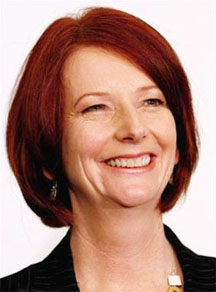PERTH, Australia, (Reuters) – Leaders of the Common-wealth group of mostly former British colonies today took tentative steps to tighten up on human rights abuses by members, but have still to address tougher measures some warn the group must take to remain relevant.

Britain’s 85-year-old Queen Elizabeth opened the meeting of leaders of the 54 states of the Commonwealth, home to a third of the world’s population and five of the G20 leading economies but struggling to make much impact on global policies.
Australian Prime Minister Julia Gillard told reporters that the leaders had backed an internal report calling for a more proactive stance in defending human rights.
“That report and all of its reform proposals and recommendations, has been adopted … It means that this meeting has already acted to embrace reform and strengthening of the Commonwealth,” she said.
“The purpose of these reform proposals is to enable the Commonwealth to act when a country is veering off course in terms of democratic values and the rule of law, rather than waiting until a country has gone to a grossly unacceptable stage, and leaders only having the option of suspension or expulsion in front of them.”
The leadup to the summit has been dominated by pressure to take a stronger line on human and political rights abuses, with a spotlight on Sri Lanka, which will host the next Commonwealth summit in 2013.
Sri Lanka is under international pressure to allow an independent inquiry into accusations of war crimes during its 25-year civil war, especially in its final months in 2009.
It says will wait for the results of its own investigation next month, calling the pressure over human rights a propaganda war waged by the defeated Tamil Tigers.
“There does need to be truth telling,” Gillard said.
Canada, home to a large ethnic Tamil community, has said it will boycott the 2013 Commonwealth summit in Sri Lanka, unless the host country improves its human rights record.
RISKING IRRELEVANCE?
The summit still has to grapple with the contentious “eminent persons” report which warns that without a much tougher stand, the Commonwealth could slide into irrelevance.
A key suggestion in the confidential report, seen by Reuters, is for the group to establish a human rights commissioner — which some members oppose.
“Today, Commonwealth leaders are faced with a choice — reform the Commonwealth so that it can effectively address human rights violations by its members, or risk becoming irrelevant,” said Madhu Malhotra, Amnesty International’s Asia-Pacific Deputy Director.








